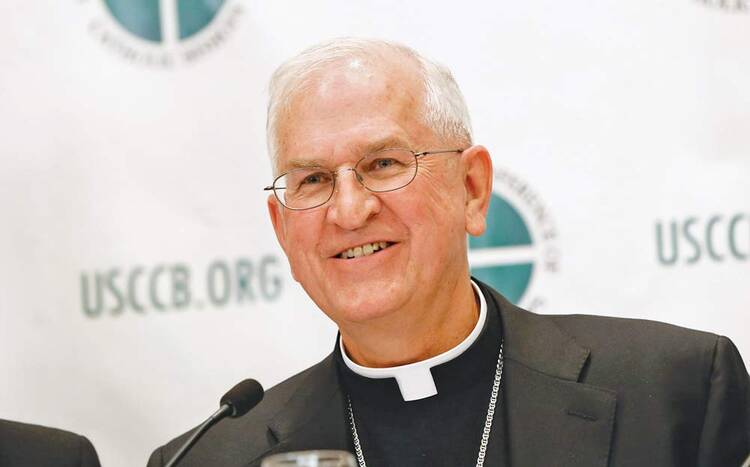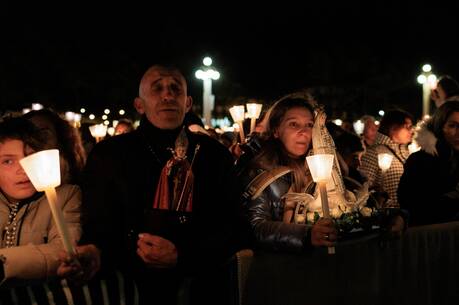Archbishop Joseph E. Kurtz, president of the U.S. Conference of Catholic Bishops, called a lawsuit filed by the American Civil Liberties Union “misguided” and “baseless.” The suit, filed on Nov. 29, targets the U.S. bishops’ “Ethical and Religious Directives,” arguing that the alleged mistreatment of a patient suffering a miscarriage at a Catholic medical center in Michigan was attributable to the directives.
The A.C.L.U.’s client, Tamesha Means, had been 18 weeks pregnant when she sought assistance at Mercy Health Partners in Muskegon, Mich., after her water broke. According to the suit, the hospital sent her home twice despite the seriousness of her condition and the pain she was suffering. “Because of the Directives,” the suit charges, “M.H.P. did not inform Ms. Means that, due to her condition, the fetus she was carrying had virtually no chance of surviving, and continuing her pregnancy would pose a serious risk to her health. Nor did M.H.P. tell Ms. Means that the safest treatment option was to induce labor and terminate the pregnancy. M.H.P also did not tell Ms. Means that it would not terminate her pregnancy, even if necessary for her health, because it was prohibited from doing so by the Directives.”
All Catholic hospitals in the United States are required to adhere to the directives. They guide Catholic health care facilities in addressing a wide range of ethical questions, such as abortion, euthanasia, care for the poor, medical research, treatment of rape victims and other issues.
In a statement released on Dec. 6, Archbishop Kurtz said, “The church holds that all human life, both before and after birth, has inherent dignity, and that health care providers have the corresponding duty to respect the dignity of all their patients. This lawsuit argues that it is legally ‘negligent’ for the Catholic bishops to proclaim this core teaching of our faith. Thus, the suit urges the government to punish that proclamation with civil liability, a clear violation of the First Amendment.”
Kary Moss, the executive director of the Michigan A.C.L.U. office, said the decision to pursue the bishops rather than Mercy Health Partners was partly the result of the statute of limitations (the incident in question took place in 2010) and partly because “this is not a medical malpractice suit,” but a case of negligence. Moss explained the A.C.L.U.’s reasoning in a phone interview with America and by e-mail.
“M.H.P. has stated that it adheres to the directives,” Moss said. “When Ms. Means went to M.H.P., she did not receive necessary treatment, information about treatment options or information about risks to her health if the pregnancy continued. The lawsuit alleges that the directives are responsible for M.H.P. not providing treatment to Ms. Means and not providing her with information about her health risk and treatment options.”
Moss said that the A.C.L.U. did not object in principle to the use of the directives in Catholic institutions except when it meant the “subjugation of women’s care” to the directives. She said, “The A.C.L.U. believes that although everyone has the right to their religious beliefs, decisions about medical care should be made by patients and their physicians.”
According to Moss, “When a patient in Ms. Means’s condition goes to the hospital, decisions about the type of care that should be provided and the type of information that is necessary for a patient, whether at a Catholic or non-Catholic health facility, should be based on a physician’s medical judgment.” Asked if it was the judgment of the A.C.L.U. that U.S. health care facilities should not be allowed to operate unless they were willing to refer or perform emergency termination of pregnancies, Ms. Moss replied, “Health care facilities, whether secular or religious, should be held to the same standard—doing what is best for the patient.”
She said, “A patient should not be prevented from obtaining medically accurate information and medically necessary treatment, including a medically necessary pregnancy termination, at a hospital simply because of the hospital’s religious affiliation.”
Archbishop Kurtz said, “A robust Catholic presence in health care helps build a society where medical providers show a fierce devotion to the life and health of each patient, including those most marginalized and in need. It witnesses against a utilitarian calculus about the relative value of different human lives. And it provides a haven for pregnant women and their unborn children regardless of their financial resources.”








